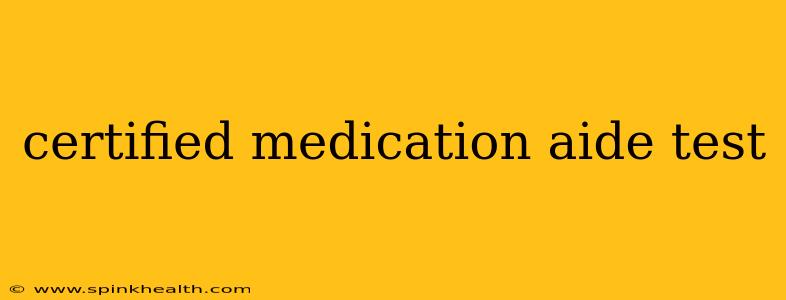The Certified Medication Aide (CMA) test is a significant hurdle for aspiring healthcare professionals. It's a testament to your dedication and commitment to providing safe and effective medication administration. This journey, however, doesn't have to feel daunting. This guide will walk you through the process, addressing common concerns and providing insights to help you confidently approach and conquer the CMA exam.
Imagine this: You're in a bustling nursing home, the scent of freshly brewed coffee mingling with the gentle hum of conversation. You're calmly and efficiently dispensing medications, ensuring each resident receives the precise dosage at the correct time. That's the reality a successful CMA test unlocks. It's a pathway to a rewarding career where you make a real difference in the lives of others.
But let's be honest, the road to certification isn't a stroll in the park. Preparation is key. It’s about more than just memorizing facts; it's about internalizing the principles of safe medication practices. Let's dive into the key aspects to consider:
What Does the CMA Test Cover?
The CMA test covers a broad range of topics crucial for safe medication administration. This includes, but isn't limited to:
- Medication knowledge: Understanding various drug classes, their indications, contraindications, side effects, and interactions. This is the cornerstone of your CMA role.
- Dosage calculations: Accuracy is paramount. The test will assess your ability to calculate dosages correctly, ensuring patient safety.
- Legal and ethical considerations: Knowing the laws and regulations governing medication administration is crucial. Ethical conduct forms the basis of trust with patients and colleagues.
- Documentation and record-keeping: Meticulous documentation is non-negotiable in healthcare. The test will evaluate your understanding of proper charting and record-keeping techniques.
- Patient rights and safety: Prioritizing patient safety is at the heart of the CMA profession. The test will focus on your ability to recognize and respond to potential risks.
- Communication and teamwork: Effective communication is paramount in a healthcare setting. The test will also examine your understanding of teamwork and collaboration.
How Difficult is the CMA Test?
This is a question many aspiring CMAs ask. The difficulty level varies depending on individual preparation and background. The test is designed to thoroughly assess your competence in safe medication practices. While challenging, it's certainly conquerable with dedicated preparation. Many consider it to be a comprehensive assessment demanding a solid understanding of pharmaceutical principles, patient safety, and legal aspects.
What are the Best Ways to Study for the CMA Test?
Effective studying involves a multifaceted approach:
- Utilize reputable study materials: Look for CMA exam prep books, online resources, and practice tests designed to mirror the actual examination.
- Create a study schedule: Consistency is vital. Break down the material into manageable chunks and allocate dedicated study time.
- Practice, practice, practice: Solve numerous dosage calculation problems and work through practice tests to improve your speed and accuracy.
- Join study groups: Collaborating with peers can enhance your understanding of complex concepts and provide additional support.
- Seek mentorship: If possible, seek guidance from experienced CMAs or healthcare professionals.
What Happens If I Fail the CMA Test?
Failing the CMA test isn't the end of the world. Most certifying bodies allow for retakes. Analyze your performance on the previous attempt, identify your weak areas, and address them with focused study. Remember, persistence is key. Learn from your mistakes, adjust your study strategy, and try again.
What are the Job Prospects for Certified Medication Aides?
The demand for CMAs is steadily growing, offering excellent job prospects in various healthcare settings including nursing homes, assisted living facilities, and hospitals. Your certification signifies competency and professionalism, enhancing your marketability and career advancement opportunities.
The journey to becoming a Certified Medication Aide is a commitment, but a deeply rewarding one. With dedicated preparation and a positive mindset, you can confidently navigate the CMA test and embark on a fulfilling career contributing to the well-being of others. Remember, your dedication to patient care is the most valuable asset you bring to this profession.

